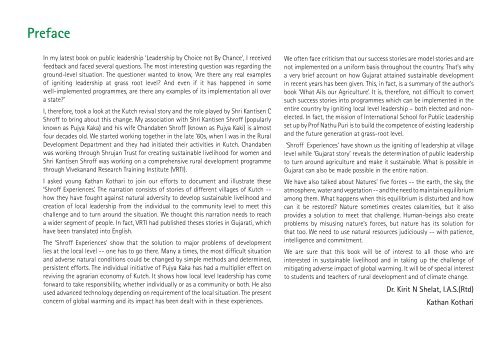Sustainable Development - International School of Public Leadership
Sustainable Development - International School of Public Leadership
Sustainable Development - International School of Public Leadership
You also want an ePaper? Increase the reach of your titles
YUMPU automatically turns print PDFs into web optimized ePapers that Google loves.
Preface<br />
In my latest book on public leadership ‘<strong>Leadership</strong> by Choice not By Chance’, I received<br />
feedback and faced several questions. The most interesting question was regarding the<br />
ground-level situation. The questioner wanted to know, ‘Are there any real examples<br />
<strong>of</strong> igniting leadership at grass root level? And even if it has happened in some<br />
well-implemented programmes, are there any examples <strong>of</strong> its implementation all over<br />
a state?’<br />
I, therefore, took a look at the Kutch revival story and the role played by Shri Kantisen C<br />
Shr<strong>of</strong>f to bring about this change. My association with Shri Kantisen Shr<strong>of</strong>f (popularly<br />
known as Pujya Kaka) and his wife Chandaben Shr<strong>of</strong>f (known as Pujya Kaki) is almost<br />
four decades old. We started working together in the late ’60s, when I was in the Rural<br />
<strong>Development</strong> Department and they had initiated their activities in Kutch. Chandaben<br />
was working through Shrujan Trust for creating sustainable livelihood for women and<br />
Shri Kantisen Shr<strong>of</strong>f was working on a comprehensive rural development programme<br />
through Vivekanand Research Training Institute (VRTI).<br />
I asked young Kathan Kothari to join our efforts to document and illustrate these<br />
‘Shr<strong>of</strong>f Experiences’. The narration consists <strong>of</strong> stories <strong>of</strong> different villages <strong>of</strong> Kutch --<br />
how they have fought against natural adversity to develop sustainable livelihood and<br />
creation <strong>of</strong> local leadership from the individual to the community level to meet this<br />
challenge and to turn around the situation. We thought this narration needs to reach<br />
a wider segment <strong>of</strong> people. In fact, VRTI had published theses stories in Gujarati, which<br />
have been translated into English.<br />
The ‘Shr<strong>of</strong>f Experiences’ show that the solution to major problems <strong>of</strong> development<br />
lies at the local level -- one has to go there. Many a times, the most difficult situation<br />
and adverse natural conditions could be changed by simple methods and determined,<br />
persistent efforts. The individual initiative <strong>of</strong> Pujya Kaka has had a multiplier effect on<br />
reviving the agrarian economy <strong>of</strong> Kutch. It shows how local level leadership has come<br />
forward to take responsibility, whether individually or as a community or both. He also<br />
used advanced technology depending on requirement <strong>of</strong> the local situation. The present<br />
concern <strong>of</strong> global warming and its impact has been dealt with in these experiences.<br />
We <strong>of</strong>ten face criticism that our success stories are model stories and are<br />
not implemented on a uniform basis throughout the country. That’s why<br />
a very brief account on how Gujarat attained sustainable development<br />
in recent years has been given. This, in fact, is a summary <strong>of</strong> the author’s<br />
book ‘What Ails our Agriculture’. It is, therefore, not difficult to convert<br />
such success stories into programmes which can be implemented in the<br />
entire country by igniting local level leadership – both elected and nonelected.<br />
In fact, the mission <strong>of</strong> <strong>International</strong> <strong>School</strong> for <strong>Public</strong> <strong>Leadership</strong><br />
set up by Pr<strong>of</strong> Nathu Puri is to build the competence <strong>of</strong> existing leadership<br />
and the future generation at grass-root level.<br />
‘Shr<strong>of</strong>f Experiences’ have shown us the igniting <strong>of</strong> leadership at village<br />
level while ‘Gujarat story’ reveals the determination <strong>of</strong> public leadership<br />
to turn around agriculture and make it sustainable. What is possible in<br />
Gujarat can also be made possible in the entire nation.<br />
We have also talked about Natures’ five forces -- the earth, the sky, the<br />
atmosphere, water and vegetation -- and the need to maintain equilibrium<br />
among them. What happens when this equilibrium is disturbed and how<br />
can it be restored? Nature sometimes creates calamities, but it also<br />
provides a solution to meet that challenge. Human-beings also create<br />
problems by misusing nature’s forces, but nature has its solution for<br />
that too. We need to use natural resources judiciously -- with patience,<br />
intelligence and commitment.<br />
We are sure that this book will be <strong>of</strong> interest to all those who are<br />
interested in sustainable livelihood and in taking up the challenge <strong>of</strong><br />
mitigating adverse impact <strong>of</strong> global warming. It will be <strong>of</strong> special interest<br />
to students and teachers <strong>of</strong> rural development and <strong>of</strong> climate change.<br />
Dr. Kirit N Shelat, I.A.S.(Rtd)<br />
Kathan Kothari


